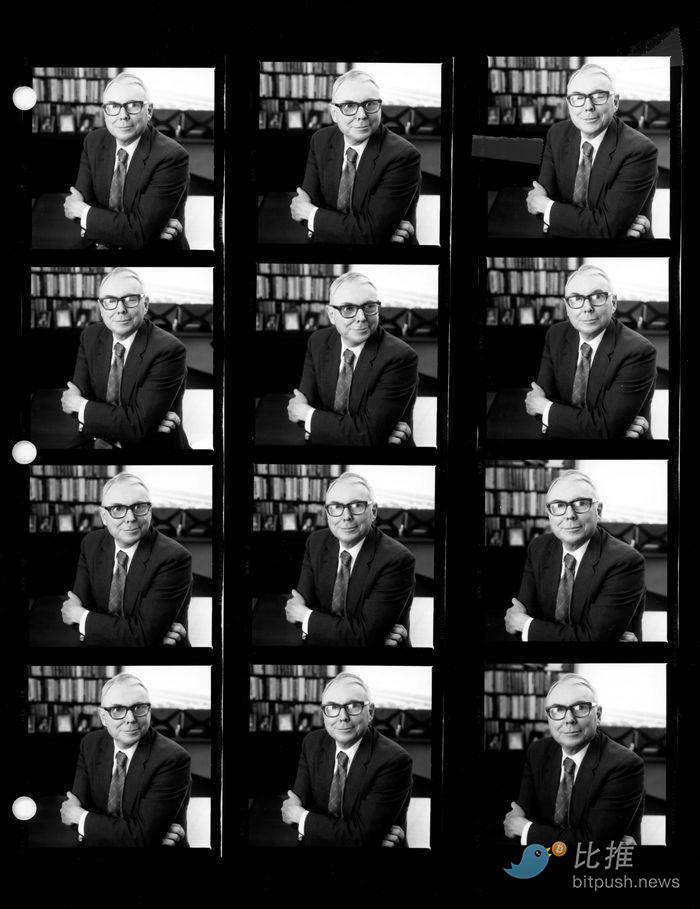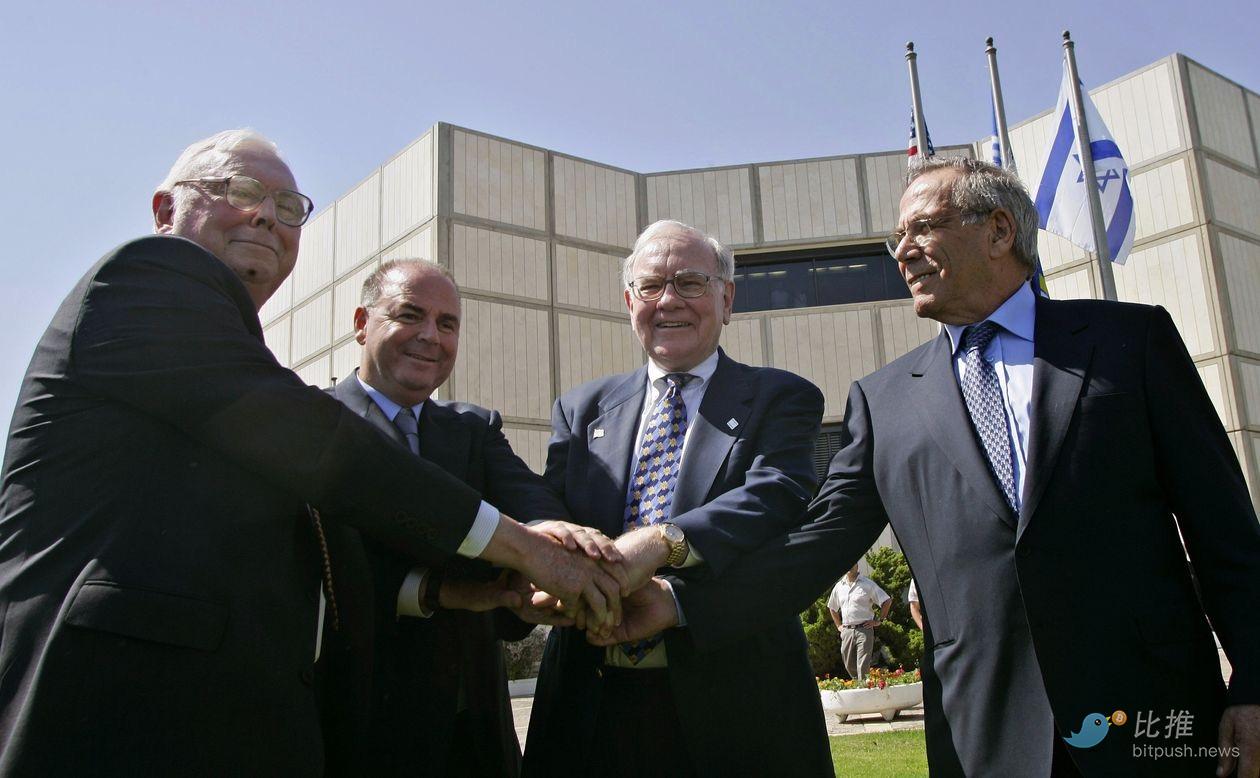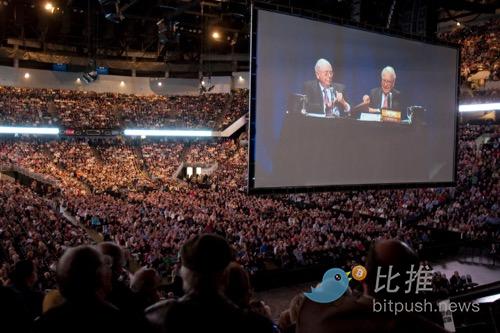Source: The Wall Street Journal
Compiled by: BitpushNews Mary Liu
Few business partners have been as adept at playing the role of "sidekick" as Charlie Munger.
Warren Buffett's closest friend and advisor for sixty years, billionaire and vice chairman of Berkshire Hathaway, Munger, peacefully passed away at a hospital in California on Tuesday at the age of 99.
In public, especially in front of tens of thousands of attendees at the Berkshire annual meeting, Munger would hand over the microphone and spotlight to Chairman Buffett. Munger often said in a hoarse voice, "I have nothing to add."
But privately, Buffett often heeded Munger's advice.
Munger Changed Buffett
In 1971, Munger persuaded Buffett to acquire See's Candy Shop at a price three times its net worth—Buffett later recalled it as a "high price," far above what he was accustomed to paying for businesses.
Over the next few decades, See's continued to bring in about $2 billion in cumulative profits for Berkshire.
As Buffett wrote in 2015, "This purchase ended my pursuit of 'cigar-butt' investing—buying mediocre companies at 'cheap' prices—and led me to start looking for outstanding businesses at a [fair] price." He added, "Charlie has been pushing me to learn this lesson for years, but I was slow to learn."
Buffett referred to Munger as the "abominable no-man" because he rejected potential investments, including some that Buffett might have pursued. But Munger's fascination with engineering and technology also led Buffett, who was fearful of technology, to make significant investments in electric car manufacturer BYD and Israeli machine tool manufacturer Iscar.
Munger himself was an outstanding investor. He began managing investment partnerships in 1962. From then until 1969, the S&P 500 index averaged a 5.6% annual increase. Buffett's partnerships averaged a 24.3% annual return. Munger's performance was even better, with an average annual return of 24.4%.

In 1975, shortly before he joined Berkshire as vice chairman, Munger closed his investment partnership. Over its 14-year history, his investment portfolio averaged a 19.8% annual increase; the S&P 500 index only grew by 5.2%.
For a long time, these two individuals had different investment approaches. Influenced by his mentor Benjamin Graham, Buffett would almost buy any company, even if it was on the brink of bankruptcy, as long as it was cheap.
Berkshire Hathaway is one of the results of the "cigar-butt" investment philosophy. When Buffett acquired the company in 1965, it was still a dilapidated textile manufacturer.
As Buffett transformed Berkshire Hathaway into a diversified holding company with insurance, he had been seeking cheap mediocre businesses. In contrast, Munger focused on large businesses at acceptable prices, believing that their future cash-generating ability would compensate for the premium paid in advance.
After years of discussion, Munger persuaded his partners to make a change.
In 1988, Buffett said, "Charlie has greatly influenced me. My God, if I had only listened to Ben (Graham), I would probably be poorer?"
In 2015, Buffett wrote that Munger taught him, "Forget what you know about buying mediocre businesses at great prices; instead, buy great businesses at fair prices."

Buffett added, "Berkshire was built according to Charlie's blueprint."
Early Life
Charles Thomas Munger was born on New Year's Day in 1924 in Omaha, Nebraska. His mother, Florence, was a homemaker and avid reader.
Munger majored in mathematics at the University of Michigan and left school during World War II to join the United States Army Air Corps. The military first sent Munger to study thermodynamics and meteorology at the University of New Mexico and the California Institute of Technology, then to an Air Force base in Nome, Alaska, where he served as a weather forecaster.
After the war, Munger convinced a dean at Harvard Law School to admit him without an undergraduate degree, and he graduated with excellent grades.
Before settling in Southern California, he considered joining his father's clinic in Omaha. He and several partners eventually opened their own law firm in 1962. Today, the firm, Munger, Tolles & Olson, has about 200 lawyers.
His first marriage to Nancy Huggins ended in divorce. In 1956, Munger married his second wife, Nancy Barry Borthwick, who passed away in 2010. They had four children, two from Munger's previous marriage.
Munger also experienced great sorrow: in 1955, his 9-year-old son Teddy died of leukemia.
Munger recalled walking the streets of Pasadena in despair, saying, "I was losing a child bit by bit." More than sixty years later, the pain of losing his son still brings tears to his eyes.
In 1978, a surgeon made a mistake during cataract surgery, causing Munger to lose sight in one eye, which had to be surgically removed. But he did not blame the doctor and pointed out that 5% of such surgeries result in complications. For him, as always, the numbers were most important.
Munger taught himself Braille and then found that his remaining vision was sufficient for reading.
In his early 90s, he was still able to drive, which often surprised his friends and family.
The two operators of Berkshire Hathaway met in 1959, when Munger had already moved to Los Angeles to attend a dinner in his hometown, which Buffett also attended.
They already knew each other's names: Munger had worked at Buffett's grandfather's grocery store as a child. One of the first investors in Buffett's partnership gave him money because he said, "You remind me of Charlie Munger."
Buffett's first wife, Susan, recalled the dinner in 1998, saying, "I think Warren felt that Charlie was the smartest person he had ever met, and Charlie felt that Warren was the smartest person he had ever met."

They hit it off and soon became inseparable, often talking several times a day.
A photo from a trip to Savannah, Georgia in the 1980s captured the striking resemblance between the two investors: speaking and walking in sync, both wearing khaki pants and open-collared blue dress shirts. From height to hairline, from eyeglass frames to wrinkles on their clothes, everything seemed to match.
Humorous Investment Tycoon
Munger's hero was Benjamin Franklin, whom he admired for his curiosity, originality, and wisdom. Munger's own common sense, sharp humor, straightforwardness, and disdain for conventional wisdom made him a celebrity among investors.
During the Q&A session at the Berkshire annual meeting, when Buffett delivered lengthy speeches, Munger would often remain silent. Investors who knew him knew that Munger was about to display his wit.
At Berkshire's 2000 annual meeting, a shareholder asked about the speculative behavior of internet stocks and its impact on the economy. Buffett gave a nearly 550-word response.
Munger summed it up in one sentence: "Even if you mix raisins with excrement, it's still excrement."
When a shareholder asked at the 2004 meeting how Berkshire set executive compensation, Buffett talked for over five minutes, but Munger calmly said, "Well, I'd rather throw a snake into a shirt than hire a compensation consultant."

In 2023, at the age of 99, Munger published a column in The Wall Street Journal, calling on the U.S. government to ban Bitcoin and other cryptocurrencies, writing that cryptocurrencies are "close to 100% gambling contracts." Previously, he had described Bitcoin as "disgusting activity" and "rat poison."
Articulate and Astonishing Endurance
Munger's understated image was just a disguise to avoid stealing Buffett's limelight. When not in the spotlight alongside Berkshire's chairman, he was quite talkative. At regular lunches and dinners with friends and family, as well as at the annual meeting of a small media company he chaired, The Daily Journal, he could talk for hours.
As many friends pointed out, if he paused to take a sip of water and others started speaking, Munger would haughtily raise his index finger to prevent them from interrupting until he finished drinking.
His endurance was also extraordinary.
In 2019, at the age of 95, Munger, at 6 p.m., had two Wall Street Journal reporters show up at his home in Los Angeles and talked almost non-stop until close to midnight. After 10 p.m., there were several occasions when one or both reporters hesitated to get up to leave; Munger gestured for them to stay.
In August 2023, at the age of 99, Munger insisted on going to Minnesota with his large family (including over a dozen grandchildren and great-grandchildren) for their annual fishing trip, a tradition they had maintained for decades.
His friend, Peter Kaufman, chairman of aerospace components manufacturer Glenair, said that at the time, Munger was "spiritually better than ever."
Munger was content with his public image as Buffett's irascible assistant and amassed his own wealth.

He made donations to institutions such as Stanford University, Good Samaritan Hospital in Los Angeles, and Planned Parenthood. He was also an amateur architect, living in a house he designed himself in the 1950s. In his later years, he became obsessed with designing buildings for college and high school campuses.
In addition to investment returns, he had fervent followers. Munger served as chairman of Berkshire's subsidiary Wesco Financial, whose stock was publicly traded until its parent company fully acquired it in 2011. Fans traveled from afar, some from China and India, to listen to his speeches at Wesco's annual meeting and later at The Daily Journal's annual meeting.
A collection of writings about Munger, "Poor Charlie's Almanack," written by Kaufman, became an international bestseller.
Munger never stopped advocating traditional virtues, with his two favorite words being diligence and calmness.
In a speech in 2007, he expressed his fondness for diligence because "it means sitting down until you do it." He often said that the key to successful investing is years or even decades of waiting for cheap assets to eventually materialize and then "aggressively" buying in.
He liked calmness because it reflected his investment and life philosophy. Munger often said that the stock market would drop by 50% every few decades, and every investor should be able to remain calm.
Munger maintained his sense of humor even in his 90s, despite being almost blind and unable to walk, and his beloved wife Nancy passed away several years before him.
Around 2016, an acquaintance asked him, in his long life, who he was most grateful for. Munger replied without hesitation, "My second wife's ex-husband, for giving me the chance to love this woman for 60 years, just because I'm a man who's not as bad as he is."
免责声明:本文章仅代表作者个人观点,不代表本平台的立场和观点。本文章仅供信息分享,不构成对任何人的任何投资建议。用户与作者之间的任何争议,与本平台无关。如网页中刊载的文章或图片涉及侵权,请提供相关的权利证明和身份证明发送邮件到support@aicoin.com,本平台相关工作人员将会进行核查。




